Prime
NSSF: Allow savers mid-term access
What you need to know:
The issue: Savers money
Our view: As members save their money over time with NSSF, the question is: How do we improve savers’ lives using their savings?
The proposed National Social Security Fund (NSSF) Amendment Bill 2019 has generated much debate about taxing members’ benefits, but very little about improving workers’ lives. Research on the quality of life of NSSF beneficiaries before and after receiving their retirement benefits and post-retirement expenditure priorities was released in 2018 showing that 53 per cent of retirees exhaust their benefits within a year.
So how can this short life cycle of benefits be reversed? Savers should be sensitised in advance on potential investment classes to avoid squandering this wealth upon receiving it. Uganda has the lowest savings to Gross Domestic Product ratio at about 13.48 per cent compared to other East African countries.
Bank of Uganda data shows that about 3 to 5 per cent save regularly on a monthly basis, which is very low. In Kenya, the saving population is about 23 per cent, in Rwanda at 18 per cent and Tanzania at 13 per cent. Currently, only 9 per cent of the working population is covered by a formal pension.
This Bill should be amended with the view of improving workers’ social security instead of taxing members’ benefits should they decide to opt out before clocking 60 years.
As members save their money over time with NSSF, the question is: How do we improve savers’ lives using their savings? The proposed reforms also introduces a mandatory retirement age of 60 whereby if you withdraw your money after 60, you do not pay the tax on exit.
Much as saving with NSSF is expected to guarantee savers some income long after retirement, NSSF should allow savers to access part of their money rather than wait until clocking 60 years when they will be exempt from taxation. At 60 years, what kind of investment will one make when old age is setting in and not much productive work can be done?
The proposed Bill also says the Fund ‘may’ lend to government. But there must be a provision that compels government to return this money with interest. The conversation of net present value of money versus current needs and benefits needs to be taken on.
NSSF should consider two kinds of access: The first being gradual release of benefits. Why should NSSF, for instance, want to release one’s savings at once? The challenges associated with receiving this money at once are high.
There should also be a gradual uptake where savers have options of getting or remaining. Some employers have designed a Provident Fund that allows this.
Although research has shown that Ugandans are poor savers, the root cause of the problem is low salaries. Unless it are improved, it will be a tall order for NSSF to attract voluntary savers to their scheme.




